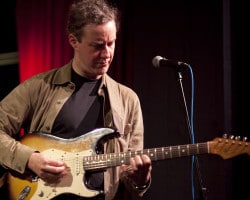Product Description
Topics Covered: Guitar, Jazz, Chromaticism, Polytonality, Motivic Development, Playing "Out", Improvisation, Altering Scales and Chords, Changing the Sound, Harmonizing Chromatic Tones, Theme and Variation, Etc.
$8.99 – $17.99

Adam Rogers is an American guitarist specializing in post bop, contemporary jazz, classical music and mixed genres. Rogers has had a prolific session history as a recording guitarist having played on over 200 commercially released recordings. He is currently a member of the Chris Potter Underground in addition to leading his own “acoustic” jazz quartets and quintets as well as the genre bending electric trio DICE as well as being a founding member (and co leader) of the eclectic group Lost Tribe. He has also performed and or recorded with Michael Brecker, Cassandra Wilson, Walter Becker, Norah Jones, Joe Jackson, Marcus Miller, John Patitucci, Paul Simon, Ravi Coltrane, John Zorn, Donny McCaslin, David Binney, Bill Evans (saxophonist), and Regina Carter among many others. He is a highly versatile player covering many areas of music but is best known for his work in the modern jazz idiom.